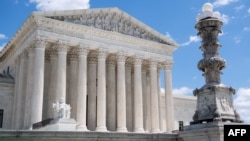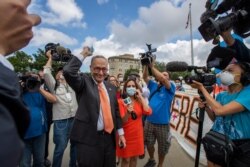The U.S. Supreme Court on Thursday blocked the Trump administration’s yearslong effort to end a program that protects from deportation hundreds of thousands of undocumented immigrants who were brought to the United States as children.
The surprise 5-4 ruling, written by conservative Chief Justice John Roberts and joined by the court’s four liberal justices, means the program known as Deferred Action for Childhood Arrivals, or DACA, will remain in place for the foreseeable future, allowing an estimated 700,000 undocumented immigrants to live and work in the United States.
The program was created in 2012 through an executive order issued by then-President Barack Obama. DACA recipients, known as “Dreamers” and mostly from Mexico and Central America, are allowed to receive benefits such as health insurance and driver’s licenses.
But President Donald Trump, who campaigned on ending DACA and illegal immigration to the country, directed the Department of Homeland Security in 2017 to phase out the program, calling it unlawful. Legal challenges to the decision to end DACA were upheld by federal courts in several states, prompting the administration’s appeal to the high court.
Inadequate rationale
Rather than determining the legality of DACA, the Supreme Court ruled that the administration failed to offer an adequate rationale for shutting down the program. That means the issue will be sent back to the Department of Homeland Security, which would have to offer a different justification if it chooses to take another stab at shutting down the program.
Writing for the majority, Roberts said the administration’s decision violated the federal law that governs administrative agencies and failed to consider DACA recipients’ rights to protection from deportation.
"We do not decide if DACA or its rescission are sound policies. We address only whether the agency complied with the procedural requirement that it supply reasoned explanation for its action,” Roberts wrote.
In a dissenting opinion joined by two fellow conservative justices, Justice Clarence Thomas wrote that the administration’s decision to terminate DACA was not illegal.
"Today's decision must be recognized for what it is: an effort to avoid a politically controversial but legally correct decision," Thomas wrote.
'Delay'
Justice Brett Kavanaugh, one of two Trump appointees on the bench, issued a separate dissent, writing that the “only practical consequence” of the court’s decision “appears to be some delay.”
In a statement, acting Homeland Security Secretary Chad Wolf criticized the court’s decision but did not indicate whether his department would reconsider the issue.
“DACA recipients deserve closure and finality surrounding their status here in the U.S.,” Wolf said. “Unfortunately, today’s Supreme Court decision fails to provide that certainty."
Thursday's decision was the second time in nearly a year that Roberts and the four liberal justices have ruled against a controversial Trump administration policy. Last year, the court forced the administration to back off plans to add a citizenship question on the 2020 census.
Criticizing the court’s decision as “highly political,” Trump wrote on Twitter that he wanted a “legal solution on DACA,” and that in light of the ruling, “we have to start this process all over again.”
“The DACA decision, while a highly political one, and seemingly not based on the law, gives the President of the United States far more power than EVER anticipated,” Trump tweeted. “Nevertheless, I will only act in the best interests of the United States of America!”
'Horrible' rulings
Slamming the Supreme Court’s rulings against his administration as “horrible & politically charged,” Trump, who often brags about appointing conservative federal judges, wrote, “We need more Justices or we will lose our 2nd. Amendment & everything else.”
The American Civil Liberties Union applauded the ruling.
"The Supreme Court rightly ruled in favor of over 700,000 citizens in waiting, their families, and our country's future. The courts and the American people agree: It's time for President Trump and [adviser] Stephen Miller to end their crusade against Dreamers and immigrants writ large," Andrea Flores, the ACLU's deputy director of immigration policy, said in a statement.
In a post on Twitter, Obama praised the ruling, saying, "Eight years ago this week, we protected young people who were raised as part of our American family from deportation. Today, I'm happy for them, their families, and all of us. We may look different and come from everywhere, but what makes us American are our shared ideals."
Anxious DACA recipients reacted with shock and relief to the news.
“I’m stunned,” said Jirayuth Latthivongskorn, a DACA recipient and one of the plaintiffs in the three consolidated lawsuits heard by the Supreme Court. “And I’m trying to process all of this and what it means to me personally, to thousands of people, to the immigration rights movement in the U.S. because this is the first major victory, at this level, since Trump became president.”
Latthivongskorn, 30, came to the United States from Thailand in 1999, two years after his parents moved to California, found work in restaurants and overstayed their visas. California is home to nearly 190,000 DACA recipients, according to Center for American Progress.
In 2012, Latthivongskorn applied for DACA protection. He attended two prestigious universities – University of California at Berkeley and Harvard University – before receiving his medical degree from USFC Medical School as the first undocumented immigrant in the school’s 155-year history.
“We got the DACA program because we fought for it and we won today because we fought for it in the past few years,” Latthivongskorn said. “Even just a few months ago, the COVID-19 pandemic has shown that thousands or tens of thousands of DACA recipients are essential workers. They are farm workers. They work in groceries stores. They are doctors, nurses and paramedics.”
According to the Center for American Progress, more than 200,000 DACA recipients have worked on the front lines of the response to the coronavirus pandemic.
VOA Thai Service’s Warangkana Chomchuen contributed to this article.







